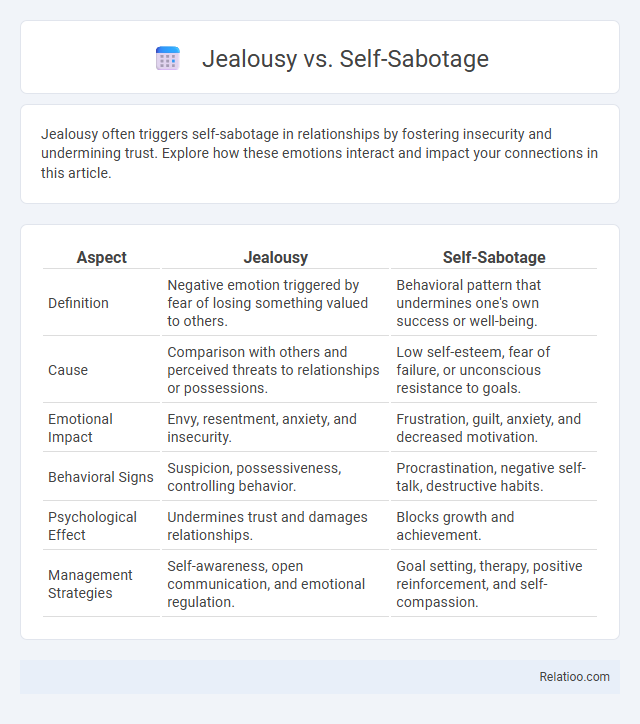Jealousy often triggers self-sabotage in relationships by fostering insecurity and undermining trust. Explore how these emotions interact and impact your connections in this article.
Table of Comparison
| Aspect | Jealousy | Self-Sabotage |
|---|---|---|
| Definition | Negative emotion triggered by fear of losing something valued to others. | Behavioral pattern that undermines one's own success or well-being. |
| Cause | Comparison with others and perceived threats to relationships or possessions. | Low self-esteem, fear of failure, or unconscious resistance to goals. |
| Emotional Impact | Envy, resentment, anxiety, and insecurity. | Frustration, guilt, anxiety, and decreased motivation. |
| Behavioral Signs | Suspicion, possessiveness, controlling behavior. | Procrastination, negative self-talk, destructive habits. |
| Psychological Effect | Undermines trust and damages relationships. | Blocks growth and achievement. |
| Management Strategies | Self-awareness, open communication, and emotional regulation. | Goal setting, therapy, positive reinforcement, and self-compassion. |
Understanding Jealousy: Definition and Roots
Jealousy is an emotional response triggered by perceived threats to a valued relationship or personal success, often rooted in fear of loss, insecurity, or low self-esteem. Unlike self-sabotage, which involves behaviors that undermine one's own goals, jealousy primarily manifests as feelings of envy or resentment toward others. Understanding jealousy requires exploring its psychological origins, including attachment styles and past experiences that shape individuals' reactions to threats or competition.
What is Self-Sabotage? Key Characteristics
Self-sabotage involves behaviors or thought patterns that undermine your own goals and well-being, often stemming from fear, low self-esteem, or unresolved emotional conflicts. Key characteristics include procrastination, self-doubt, negative self-talk, and repeated destructive choices that hinder progress. Unlike jealousy, which centers on envy of others, self-sabotage focuses on internal barriers that prevent personal success and happiness.
The Psychology Behind Jealousy
Jealousy stems from an innate fear of loss and perceived threat to self-esteem, often triggering complex emotional responses linked to attachment and insecurity. Understanding the psychology behind jealousy reveals how it can overlap with self-sabotage, where individuals unconsciously undermine their success to protect against anticipated rejection or failure. This interplay highlights how unresolved emotional conflicts fuel both jealousy and self-destructive behaviors, impacting mental health and relationships.
Common Signs of Self-Sabotaging Behavior
Jealousy often triggers feelings of inadequacy, which can lead to self-sabotaging behaviors such as procrastination, negative self-talk, and avoidance of opportunities. Common signs of self-sabotage include consistently undermining your own progress, setting unrealistic goals, and engaging in self-destructive habits that stall personal growth. Recognizing these patterns helps you break the cycle of jealousy and self-defeat to achieve greater emotional balance and success.
Jealousy vs Self-Sabotage: Core Differences
Jealousy involves feelings of insecurity and fear of losing something valuable to another person, often triggered by external comparisons and social dynamics. In contrast, self-sabotage is characterized by internal patterns of behavior that undermine one's own success or well-being through procrastination, negative self-talk, or destructive habits. Understanding these core differences is crucial for addressing emotional triggers in jealousy versus the unconscious actions driving self-sabotage.
How Jealousy Fuels Self-Sabotage
Jealousy triggers self-sabotage by amplifying insecurity and fear of inadequacy, leading individuals to undermine their own success. This emotional turmoil creates a negative feedback loop where doubts fuel destructive behaviors, such as procrastination or withdrawal, which hinder personal growth. Neuropsychological studies indicate that jealousy activates brain regions associated with pain and stress, increasing vulnerability to self-defeating actions.
The Impact on Relationships and Success
Jealousy often triggers distrust and conflict in relationships, undermining emotional stability and communication, while self-sabotage manifests through behaviors that hinder personal growth and achievement. Both jealousy and self-sabotage create barriers to success by fostering insecurity and reducing motivation, leading to missed opportunities and strained social connections. Understanding these psychological patterns is crucial to developing healthier relational dynamics and unlocking one's full potential.
Overcoming Jealousy: Effective Strategies
Overcoming jealousy involves recognizing its root causes, such as insecurity or fear of loss, and shifting focus towards self-growth and gratitude. Implementing mindfulness practices and cognitive reframing techniques aids in managing negative emotions and reducing comparison-driven thoughts. Building self-esteem through positive affirmations and goal-setting fosters emotional resilience, helping to break the cycle of jealousy and avoid self-sabotage behaviors.
Breaking the Cycle of Self-Sabotage
Jealousy often triggers self-sabotage by fueling insecurities that undermine personal goals and relationships. Recognizing patterns of negative self-talk and emotional triggers is essential to breaking the cycle of self-sabotage. Implementing strategies like mindfulness, goal-setting, and seeking therapeutic support can empower individuals to overcome jealousy-induced self-destructive behaviors and foster self-growth.
Building Emotional Resilience for Personal Growth
Jealousy often triggers self-sabotage by undermining your confidence and prompting actions that hinder personal growth. Building emotional resilience involves recognizing these destructive patterns and developing strategies to manage your emotions effectively. Strengthening emotional resilience empowers you to overcome jealousy, reduce self-sabotaging behaviors, and foster lasting personal development.

Infographic: Jealousy vs Self-sabotage
 relatioo.com
relatioo.com